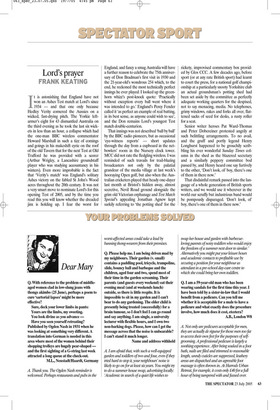Lord’s prayer
FRANK KEATING
It is astonishing that England have not won an Ashes Test match at Lord’s since 1934 — and that one only because Hedley Verity cornered the Aussies on a wicked, fast-drying pitch. The Yorkie leftarmer’s eight for 43 dismantled Australia on the third evening as he took the last six wickets in less than an hour, a collapse which had the one-man BBC wireless commentator Howard Marshall in such a tizz of comings and goings in his makeshift eyrie on the roof of the old Tavern that for the next Test at Old Trafford he was provided with a scorer (Arthur Wrigley, a Lancashire groundstaff player who was studying accountancy in his winters). Even more improbable is the fact that ‘Verity’s match’ was England’s solitary Ashes victory on the fabled St John’s Wood acres throughout the 20th century. It was not a very smart move to nominate Lord’s for this opening Test of 2005, and by the time you read this you will know whether the dreaded jinx is holding up. I fear the worst for England, and fancy a smug Australia will have a further reason to celebrate the 75th anniversary of Don Bradman’s first visit in 1930 and the 21-year-old’s wondrous 254 which, to the end, he reckoned the most technically perfect innings he ever played. I looked up the greenhorn whizz’s post-knock quote: ‘Practically without exception every ball went where it was intended to go.’ England’s Percy Fender called it ‘as perfect an example of real batting, in its best sense, as anyone could wish to see’, and the Don remains Lord’s youngest Test match double-centurion.
That innings was not described ‘ball by ball’ by the BBC radio pioneers, but as occasional ‘eye-witness reports’ — short updates through the day from a cupboard in the netbowlers’ room in the Nursery clock tower. MCC did not rate the fledgling wireless. I was reminded of such travails for trail-blazing broadcasters not only by the palatial grandeur of the media village at last week’s hooraying Open golf, but also when the Australian cricketers played that heady one-dayer last month at Bristol’s hidden away, almost secretive, Nevil Road ground alongside the grim old Victorian orphanage and Test Match Special’s appealing Jonathan Agnew kept sarkily referring to ‘the potting shed’ for the rickety, improvised commentary box provided by Glos CCC. A few decades ago, before sport (or at any rate British sport) had learnt to court the press, for a national golf championship at a particularly snooty Yorkshire club an actual groundsman’s potting shed had been set aside by the committee as perfectly adequate working quarters for the despised, not to say menacing, media. No telephones, grimy windows, rakes and forks all over, flattened sacks of seed for desks, a rusty roller for a seat.
Senior writer heroes Pat Ward-Thomas and Peter Dobereiner protested angrily at such belittling arrangements. To no avail, and the gruff and portly legend Henry Longhurst happened to be grouchily scribbling his ever wonderful Sunday Times column in the shed as the blazered secretary and a similarly peppery committee bod passed by, and Henry heard one say furtively to the other, ‘Don’t look, ol’ boy, there’s one of them in there now.’ That disdainful remark passed into the language of a whole generation of British sports writers, and we would use it wherever in the world our scruffy but industrious band would be pompously disparaged. ‘Don’t look, ol’ boy, there’s one of them in there now.’















































 Previous page
Previous page